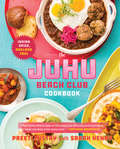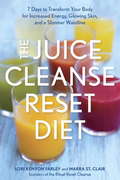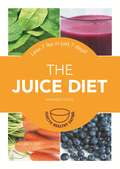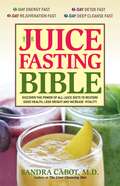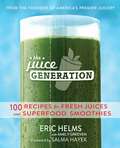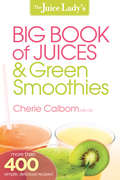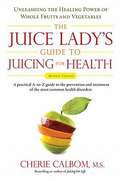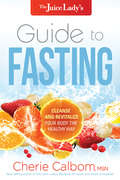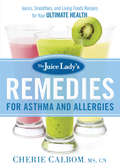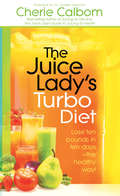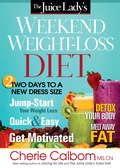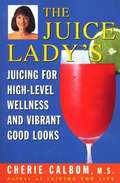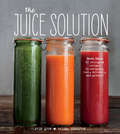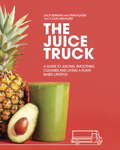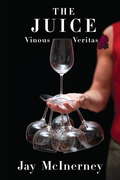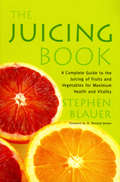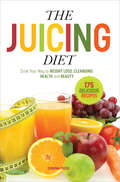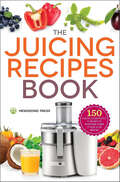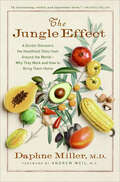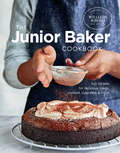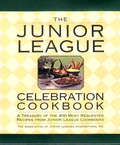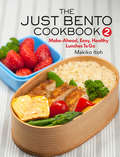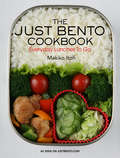- Table View
- List View
The Juhu Beach Club Cookbook: Indian Spice, Oakland Soul
by Preeti Mistry Sarah Henry"What Preeti Mistry does on the page is as delicious and exciting as what she does in her restaurant." - Anthony BourdainVibrant and unexpected, The Juhu Beach Club Cookbook is a bold take on Indian food from Oakland-based James Beard Award nominee Preeti Mistry.Influenced by her background as a second-generation Indian -- born in London, raised across the US, now based in the Bay Area -- Preeti's irreverent style informs her personality and her food. This collection of street food, comfort classics, and restaurant favorites blends cuisines from across India with American influences to create irresistible combinations. Organized by feeling rather than course or season, with chapters like Masala Mashups, Farm Fresh, and Authentic? Hell Yeah, The Juhu Beach Club Cookbook weaves Preeti's culinary journey together with more than 100 bold, flavor-forward recipes to excite and inspire home cooks. Illustrated throughout with full-color photography and playful line art, this book captures the eclectic energy and wide-ranging influences of one of the West Coast's most up-and-coming chefs.
The Juice Cleanse Reset Diet
by Marra St. Clair Lori Kenyon FarleyA groundbreaking 7-day diet based on the popular Ritual Juice Cleanse, which resets the system by clearing the body of toxins and acidity to reduce cravings and promote lasting weight loss and improved overall health.Before any long-term diet and exercise program can work, we must "reset" our bodies to clear the toxins and acidity that cause cravings and prevent us from absorbing key nutrients. In just one week, The Juice Cleanse Reset Diet prepares the body for weight loss with a series of cleansing juices and then integrates healthy meals and fitness tips to free us of the bad habits that sabotage our health goals. Followed by stars like Kris Jenner, Charlie Sheen, and Kim Kardashian--who used it to prepare for her wedding--this simple and easy program first identifies what type of cleanse we need based on our individual eating and drinking habits and then presents 60 recipes for cleansing and eating our way to optimal health.
The Juice Diet: Lose 7lbs in just 7 days!
by Amanda CrossWhether you want to fit into a special outfit, look good on the beach or kickstart a long-term weight-loss plan, one week with The Juice Diet is all you need to lose 3 kg (7 lbs).With 42 simple recipes for delicious, be-good-to-yourself juices, this healthy, fast-track diet will cleanse your system so that you lose weight and rid your body of toxins. Including all you need to know about why the diet works plus motivational tips, ideas for daily treats and gentle exercise routines, get ready to juice and lose with The Juice Diet!
The Juice Diet: Lose 7lbs in just 7 days!
by Amanda CrossWhether you want to fit into a special outfit, look good on the beach or kickstart a long-term weight-loss plan, one week with The Juice Diet is all you need to lose 3 kg (7 lbs). With 42 simple recipes for delicious, be-good-to-yourself juices, this healthy, fast-track diet will cleanse your system so that you lose weight and rid your body of toxins. Including all you need to know about why the diet works plus motivational tips, ideas for daily treats and gentle exercise routines, get ready to juice and lose with The Juice Diet!
The Juice Fasting Bible: Discover the Power of an All-Juice Diet to Restore Good Health, Lose Weight and Increase Vitality
by Sandra CabotA holistic doctor shows how juice fasting can help you detoxify your body, boost energy, burn fat, and lose weight—includes nutritious juice recipes.In today’s world, it is vital to detox! And there is no better way than by doing a juice fast. Fresh juices are bursting with healthy ingredients: antioxidants, vitamins, natural antibiotics, beneficial nutrients, anti-inflammatories, and even enzymes that vastly improve digestion and flush the intestinal tract.The Juice Fasting Bible helps you harness the natural rejuvenating power of juices to improve your quality of life, enhance fitness, provide extra energy and even lengthen your lifespan. It shows how you can turn your love of juice into something wonderful for your body.The Juice Fasting Bible guides you step by step through the entire cleansing process:• Finding the Best Fruits and Vegetables• Choosing the Right Fast• Handling the Fast with Ease• Enjoying Glorious Juice Recipes• Ending Your Fast Properly
The Juice Generation
by Amely Greeven Salma Hayek Eric HelmsWelcome to the Juice Generation ! Refresh, Restore, and Rejuvenate Get ready to live juicy with The Juice Generation. Fresh juices and superfood smoothies will help you feel energized and invigorated with glowing skin and a clear mind. The revitalizing recipes and tips will make you feel lighter and brighter, inside and out. Featuring more than 100 refreshing, health-boosting, spirit-lifting recipes The Juice Generation offers practical, down-to-earth instructions for making restorative and great-tasting vegetable and fruit juices, smoothies, and tonics. Get on the Green Curve and move confidently from smoothies to green drinks Whether you're newly juice curious, or already an old pro, The Juice Generation's plan will lead you to the endless benefits and possibilities of squeezing, crushing, and grinding, and help you integrate the joys of juicing and blending into your busy life. Juicing Tools for Detoxing and Healing The Juice Generation includes detoxing cleanses as well as flu-fighting elixirs and plenty of recipes and great advice from some of its biggest supporters, including Blake Lively, Michelle Williams, Edward Norton, Jason Bateman, and Martha Stewart.
The Juice Lady's Big Book of Juices and Green Smoothies: More Than 400 Simple, Delicious Recipes!
by Cherie CalbomThe Juice Lady, Cherie Calbom, provides all of her most popular recipes for juicing, smoothies, shakes, soups, and sauces, in one complete volume. Juice and smoothies are sweeping the nation! Why? They’re fruity, delicious, easy to make, and packed with powerful nutrition. It’s no wonder everyone is enjoying the convenience and great taste of these healthy meal and snack alternatives. Bring your blender or juicing machine into the twenty-first century with the most updated versions of Cherie’s recipes to be found anywhere. More than just refreshment, these recipes enhance your energy and boost your mental and physical health. Enjoy simple, tasty recipes for: · Healing juices and smoothies that will help fight the flu, infections, and aging skin · Low-carb juices and smoothies that will help you lose weight · Green smoothies that pack a powerful punch of phytonutrients and antioxidants · Recipes that are perfect for kids and moms on the go · Workout and body-building drinks · And more!
The Juice Lady's Guide To Juicing for Health
by Cherie CalbomA practical A-to-Z guide to the prevention and treatment of the most common health disorders. Written by nutritionist and juicing expert Cherie Calbom, The Juice Lady?s Guide to Juicing for Health, Revised Edition, shows you how to use fresh juice to lose weight, boost energy, and achieve the glow of health. With helpful guidelines for buying and using a juice machine, Cherie also explains how to put that machine to work with delicious recipes and easy-to-understand nutritional programs for more than fifty health conditions. These research-backed programs include the best combinations of fruits and vegetables for each disorder, along with a diet plan and other health tips that can help you fight off disease. This revised edition provides updated health and nutritional information on many conditions, including ADHD, cancer, chronic fatigue syndrome, diabetes, fibromyalgia, multiple sclerosis, and much more. Supporting the nutritional programs with a unique diet plan, special cleansing regimens, and detailed appendices packed with useful information, The Juice Lady?s Guide to Juicing for Health gives you a total approach to health?now, and for the rest of your life.
The Juice Lady's Guide to Fasting: Cleanse and Revitalize Your Body the Healthy Way
by Cherie CalbomUnderstand the different types of fasts, and experience improved weight loss, spiritual renewal, and optimal health. There is a new surge of interest in fasting, yet many people are unaware of how to navigate the many types- juice liquid diet, raw-foods, and Daniel vegan diet, and their various requirements and benefits. The Juice Lady, Cherie Calbom, offers her nutritional expertise on the how-tos of fasting. This comprehensive book provides menus, recipes, and strategic fasting guidelines. You will learn how to begin, what to eat and/or drink, how long to fast, and how to break a fast. Ultimately you will discover the myriad of benefits derived from fasting the right way for a healthy life.
The Juice Lady's Remedies for Asthma and Allergies: Delicious Smoothies and Raw-Food Recipes for Your Ultimate Health
by Cherie CalbomAre you one of the fifty million Americans who suffer from allergies? Fight back with these delicious living foods remedies! You don’t have to put up with the effects of allergies. By simply adding more living foods to your diet and eliminating the foods that can cause allergic reactions such as milk and wheat, you can bring your allergies under control naturally. Additionally, living foods have significant anti-inflammatory effects that help mitigate the damage even minor reactions can cause. With recipes and recommendations for healing teas, juices, smoothies, and meals this quick guide helps you… · Eat natural, healthy foods every day and watch your allergies and asthma symptoms subside · Safely eliminate toxins from your body to help your organs function more efficiently · Experience more energy and a higher level of wellness Discover a way of eating that will help you feel and look alive and vibrant each and every day of your life. A healthier life truly does await you!
The Juice Lady's Remedies for Thyroid Disorders: Juices, Smoothies, and Living Foods Recipes for Your Ultimate Health
by Cherie Calbom, MS, CNThe third book in The Juice Lady&’s Remedies series, The Juice Lady&’s Remedies for Thyroid Disorders will focus on the thyroid gland, which is tied to metabolism and appetite; mood swings; the appearance of hair, skin, and nails; muscles, joint issues, and more. This book will include:Healing teas, juices, and smoothiesGreen smoothies that pack a powerful punch of phytonutrients and antioxidantsRaw food recommendationsA section that gives you tips on choosing the best juicer and the best produce, as well as tips for prepping, cleaning, and storing your juices and smoothies, and more!
The Juice Lady's Turbo Diet: Lose Ten Pounds in Ten Days—the Healthy Way!
by Cherie Calbom, MS, CNLose Weight Quickly With Fresh Juice and Delicious Raw Foods Satisfy your bored taste buds Cut your cravings Detox your body Lose 10 pounds in just 10 days! Known as “The Juice Lady” for her expertise on juicing and raw foods, Cherie Calbom serves up freshly made juices and raw-food recipes to help you lose weight and keep it off for good. Learn about the program that has helped many people lose weight with ease. Read exciting weight-loss stories such as Dave the trucker, who lost more than 230 pounds turbo juicing. When we give our bodies the nutrients we need with delicious, healthy, and life-giving foods, losing weight becomes easier and healthier. These juicing tips, delicious recipes, and simple meal plans will help you make juicing and raw foods an integral part of your weight-loss success.
The Juice Lady's Weekend Weight-Loss Diet: Two Days to a New Dress Size
by Cherie CalbomJumpstart your living foods lifestyle, jumpstart a weight-loss program, or lose pounds quickly before a special event.This pocket-sized book provides everything you need to know to embark on a revolutionary two-day eating program that detoxifies your system and helps you lose weight quickly. Start Friday night with a juice or green smoothie dinner. Then have an all-liquid Saturday and Sunday breakfast and lunch, followed by a raw food dinner Sunday night. The key to this diet is that it is doable, easy-to-follow, and only requires a weekend commitment. It&’s great for cleansing your system and shedding a few pounds, and if you need to lose more weight, it can jumpstart any weight-loss program without overwhelming you! The results you achieve on The Juice Lady&’s Weekend Weight-Loss Diet will motivate you to lose more!
The Juice Lady(TM)'s Juicing for High-Level Wellness and Vibrant Good Looks
by Cherie CalbomThe newest book by the "Juice Lady", presents a comprehensive nutritional guide to the health benefits of juicing, with a special emphasis on common and chronic ailments.
The Juice Solution: More Than 90 Feel-Good Recipes to Energize, Fuel, Detoxify, and Protect
by Erin Quon Briana StocktonUnleash the health benefits in raw fruits, vegetables, and nuts with over ninety juicer recipes that energize, fuel, detoxify, and protect your immune system.Consuming produce in juice form preserves nutrients that would be otherwise lost in the cooking process and provides a quick and easy way to enjoy your daily dose of fruits and vegetables.Organized by different nutritional needs, this book offers a collection of juice recipes for any time of day. Energizing juices help wake up your system without the use of stimulants like caffeine. Fueling juices, made from fibrous ingredients and foods rich in healthy fats, help keep you satisfied and can be enjoyed in place of a light meal. Detoxifying juices flush toxins from your body by releasing the natural antibacterial qualities found in many fruits and vegetables. Protective juices unleash the immune–boosting properties in certain types of fresh produce.Guides to choosing an electric juicer model that’s right for you, selecting produce to target specific health needs, and tips and trips for making the most of your machine round out the book. Whether you’re a first-time juicer, an avid juice cleanser, or just looking for fresh and exciting ways to use your home juicer, this book offers shows you how to make the most from your electric juicer and start feeling like your healthiest self.
The Juice Truck: A Guide to Juicing, Smoothies, Cleanses and Living a Plant-Based Lifestyle
by Colin Medhurst Ryan Slater Zach BermanFrom Zach Berman and Ryan Slater--the longtime friends behind Vancouver's wildly successful Juice Truck--comes an accessible, informative and fresh book on the popular and healthy juicing and cleansing lifestyle.There are lots of juice books out there, but few get it right. In The Juice Truck, Zach and Ryan make it their mission to make juicing approachable, fun, imaginative and healthy. Their obsession with juicing began when they took a trip to the Himalayas and Nepal, which quickly turned from a journey of self-discovery into a full-blown juice-seeking adventure once they were introduced to the most delicious, locally-sourced juices they had ever tried. They decided then to create the same community and street side accessibility to juice in Vancouver that had inspired them throughout their travels. Alongside colourful and eye-catching photographs and illustrations that match their company's brilliant branding, The Juice Truck incorporates advice from health coach Colin Medhurst, and outlines the tools you need to make the perfect juice, the science behind juicing, and the benefits of each specific ingredient. The book dives into the juice cleanse and tells you everything you need to know about this health trend, giving you the top 10 tips to consider before embarking on a cleanse. It debunks other cleanses and outlines which ones are actually good for you and how to cleanse in a safe and proper way. The authors also break down and profile their favourite superior foods, tinctures, supplements and boosters. Once the reader is perfectly equipped, Zach and Ryan provide over 110 mouth-watering drink recipes from nut milks, smoothies, juice and hot drinks, as well as easy-to-make and delicious plant-based food recipes that can be eaten alone or accompany the many drink recipes. Interspersed throughout the recipes are case studies by experts in their fields on subjects like meditation, sleep, yoga, fiber, microbes, food allergies, sensitivities and intolerance, and the nervous system. In addition to appealing to both loyal and first-time juicers everywhere (as well as the dedicated following of the Juice Truck in Vancouver), this book will be the definitive juicing guide for people who live a healthy, active lifestyle, and those who would like to transition to a healthier diet. This is not your average juice book--it's a combination of storytelling, nutrition and tried-and-true recipes that deserves a place in every juicer's kitchen.
The Juice: Vinous Veritas
by Jay McinerneyThis new collection by the acclaimed novelist--and, according to Salon, "the best wine writer in America"--is generous and far-reaching, deeply knowledgeable and often hilarious. For more than a decade, Jay McInerney's vinous essays, now featured in The Wall Street Journal, have been praised by restaurateurs ("Filled with small courses and surprising and exotic flavors, educational and delicious at the same time" --Mario Batali), by esteemed critics ("Brilliant, witty, comical, and often shamelessly candid and provocative" --Robert M. Parker Jr.), and by the media ("His wine judgments are sound, his anecdotes witty, and his literary references impeccable" --The New York Times). Here McInerney provides a master class in the almost infinite varieties of wine and the people and places that produce it all the world over, from the historic past to the often confusing present. From such legendary châteaus as Margaux and Latour and Palmer to Australia and New Zealand and South Africa, to new contenders in Santa Rita Hills and Paso Robles, we learn about terroir and biodynamic viticulture, what Champagnes are affordable (or decidedly not), even what to drink over thirty-seven courses at Ferran Adrià's El Bulli--in all, an array of grapes and wine styles that is comprehensive and thirst inducing. And conspicuous throughout is McInerney's trademark flair and expertise, which in 2006 prompted the James Beard Foundation to grant him the MFK Fisher Distinguished Writing Award.
The Juicing Book
by Stephen BlauerComplete guide to using juices to maximize health and vitality. Offers up-to-date information on the value of juices in relation to the body's needs. Included are comprehensive charts, delicious recipes and instructions on using various juicing equipment.
The Juicing Diet: Drink Your Way to Weight Loss, Cleansing, Health, and Beauty
by Sonoma PressA juicing diet can boost your immunity and help you lose weight.Studies have shown that adding juicing into your diet can improve your body's immune response, reduce your risk for chronic disease, improve your skin and hair health, and help you easily lose weight. Fresh fruits and vegetables are loaded with vitamins and minerals, and by juicing your produce, you get all of the benefits of your produce in the purest form. The Juicing Diet is your guide to experiencing the benefits of a juicing diet. With 175 delicious juicing recipes packed full of nutrients and antioxidants, you can detox your body and begin to feel more energetic right away.The Juicing Diet will help you lose weight and improve your well-being with:175 delicious and nutritious juicing recipesIntroduction to the many health benefits of juicing30-day juicing weight-loss planSpecial tips on juicing for beauty, weight loss, and detox10 steps for success on a juicing dietWhether you're looking for a foolproof way to lose weight, or you just want add more nutrients to your diet, The Juicing Diet is sure to quench your thirst and give you an energy boost to power you through your day.
The Juicing Recipes Book: 150 Healthy Recipes to Unleash the Nutritional Power of Your Juicer Machine
by Mendocino PressGet the most out of your juicer with over 150 juicy recipes High-energy juices, cleansing juices, weight loss juices, and more—the number of juicing recipes that boost your health are virtually endless. In one complete reference, The Juicing Recipes Book packs only the best healthy, vitamin-rich juicing recipes to get the maximum benefit of your juicer.From Jet Lag Tonic to Metabolism Boosting Green Juice, these juicing recipes are organized according to their purpose, so you can get your body in top shape, lose weight, increase your energy, or detox your system. Plus, if you haven't bought your juicer yet, this book gives you the lowdown on the three main juicer types, so you can make the wisest choice for your specific health needs.The Juicing Recipes Book includes:A KICK-START GUIDE: Learn what type of juicer fits your lifestyle, which ingredients to keep on hand for your juicing recipes, and how to prep fruits and veggies.150 JUICING RECIPES: Fill your glass with the healthiest recipes like Breakfast Mojito, Spicy Tomato, Citrus Energy, Complexion Helper, and Peach-Strawberry Nectar.A JUICE FOR EVERY NEED: Choose the juice that fits your needs with options for Brain-Nourishing Juices, Alkalizing Juices, Healthful Skin Juices, and more. Find a juice for every unique body.Unlock the full benefit of your juicer machine and feel the difference with The Juicing Recipes Book.
The Jungle Effect: A Doctor Discovers the Healthiest Diets from Around the World—Why They Work and How to Bring Them Home
by Daphne MillerWhy do the relatively poor native populations in Mexico and Africa have such low levels of the chronic diseases that plague the United States? Why is the rate of seasonal affective disorder in Iceland—a country where dreary weather is the norm—so low? Why is it that older women in Okinawa have such low breast cancer rates that it is not considered cost-effective for them to get screening mammograms?The Jungle Effect has the life-changing answers to these important questions, and many more.Whether it's the heart-healthy Cretan diet, with its reliance on olive oil and fresh vegetables, the antidepressive Icelandic diet and its extremely high levels of omega-3s, the age-defying Okinawa diet and its emphasis on vegetables and fish, or the other diets explored herein, everyone who reads this book will come away with the secrets of a longer, healthier life and the recipes necessary to put those secrets into action. The Jungle Effect is filled with inspiring stories from Dr. Miller's patients, quirky travel adventures, interviews with world-renowned food experts, delicious (yet authentic) indigenous recipes, and valuable diet secrets that will stick with you for a lifetime.
The Junior Baker Cookbook: Fun Recipes for Delicious Cakes, Cookies, Cupcakes & More
by The Williams-Sonoma Test KitchenEasy-to-bake treats and desserts that let kids develop their kitchen skills!Featuring step-by-step instructions and full-color photos for over thirty sweet and savory recipes, this easy-to-follow book helps teach young people the baking basics and lets them create tantalizing treats.Beginning with a quick primer on pan prep and necessary ingredients, Junior Baker offers easy recipes that make baking a cinch. Junior Baker will inspire kids to have fun in the kitchen while providing simple instructions on how to bake up a scrumptious collection of sweet and savory favorites.Recipe highlights include: Lemon Poppy Seed Loaf Bread, Cinnamon Monkey Bread, Chocolate Tart, Lemon and Vanilla Cheesecake, Confetti Birthday Cake, Raspberry-Swirled Meringues, Cookies and Cream Cupcakes, Pumpkin Whoopie Pies, Brown Butter Rice Krispy Treats, Garlic and Herb Focaccia, Soft Pretzels and much more!This companion title to Junior Chef will be a staple for your young connoisseur!
The Junior League Celebration Cookbook
by Assoc. of Junior Leagues Int'lIn the six decades since the publication of the first Junior League cookbook, local Junior League chapters have published more than two hundred individual volumes. With nearly 20 million copies in print, they are recognized and prized by home cooks around the country. These collections feature home kitchen-tested recipes that not only preserve regional food traditions but also have literally changed the quality of life in each community through the funds that they have generated. This collection includes more than four hundred recipes, ranging from classic dishes to contemporary fare that have never before been gathered into one volume. And the original essays on regional cooking and foodways plus dozens of menus make this cookbook engaging and informative as well as a trusted source for the best recipes. Packaged in an easy-to-use concealed spiral binding with a sturdy stain-resistant cover.
The Just Bento Cookbook 2: Make-Ahead, Easy, Healthy Lunches To Go (Just Bento Cookbook #2)
by Makiko ItohThe author of the best-selling Just Bento Cookbook is back with hundreds of delicious new Japanese-lunchbox-style recipes — including many low-carb, vegetarian, and vegan options -- that can be made quickly and without a lot of fuss.The passion for bento boxes shows no signs of letting up. Leading the way in popularizing these compact and portable boxed meals has been Makiko Itoh, blogger extraordinaire and author of the perennial bestseller, The Just Bento Cookbook. Itoh was instrumental in spreading the word that bentos are perfect for busy adults-on-the-go — they don’t have to be cute and they don’t have to take a lot of planning or prep time in order to be tasty, nutritious, and economical.In THE JUST BENTO COOKBOOK 2: Make-Ahead Lunches and More, Itoh offers hundreds of new recipes for bento-friendly dishes. The premise of this second cookbook is that anyone can make delicious, healthy bentos quickly and easily. Itoh focuses on three types of bentos with specific and appealing benefits: bentos that can be made ahead of time, “express” bentos that can be put together fast, using components right off the shelf or out of the refrigerator, and bentos for special dietary needs. Full-color photos accompany the directions and showcase the finished dishes.THE JUST BENTO COOKBOOK 2 opens with Itoh’s basic bento rules, revised to reflect comments she’s heard from her many fans after the first book came out. “Build Up Your Stash” explains why having some items ready to pack up and go is the key to stress-free bento-making. Here are tips on making foods that store well, organizing storage space, the best containers to use for different foods, what store-bought items to have on hand, etc.The first section, “Make-Ahead Bentos,” features recipes for a wide variety of dishes that can be prepared the night before or first thing in the morning. Here are different kinds of meatballs and burgers, including both Western versions and Japanese variations; mouth-watering chicken, pork, beef, egg and fish dishes; a section on “Tofu and Vegan” treats such as Ginger Tofu Teriyaki and Green Lentils and Brown Rice; and recipes for Rice Sandwiches such as Egg-wrapped Rice Sandwich with Bacon Rice Filling. A special section of Low Carb recipes based on shirataki noodles and konnyaku (konjac) offers fun and creative ways to use this no-cal, no-carb, no-sugar, gluten-free “miracle” noodle in dishes like Rice and Shirataki Pilaf with Shrimp, Shirataki Chicken “Ramen” in a Lunch Jar, and Shirataki with Sesame.“Express Bentos” presents very quick-to-assemble boxes comprised of foods that don’t require detailed recipes and don’t rely on pre-homemade items. From Mediterranean Pasta and Yakisoba bentos to a Deconstructed Taco Salad and Stir-fry Bento, the ideas here will prove to be lifesavers for busy people who need to get out of the house in a hurry but still want their flavorful, filling, and healthy lunch.Other new and exciting additions to this second volume include an entire section of recipes for Vegetable Side Dishes (Roast Asparagus with Balsamic Vinegar, Spicy Broccoli, and Potato and Corn Salad), and one for Japanese Vegetable Side Dishes (Buttery Kabocha Squash, Crunchy Stir-fried Soy Beans, Hijiki Seaweed with Garlic). Recipes for different versions of dashi will help readers keep a supply of this staple ingredient at the ready. And advice on tools and equipment, types of bento boxes and accessories, as well as a glossary and resource section, will ensure that preparing bentos is as enjoyable as eating them.
The Just Bento Cookbook: Everyday Lunches To Go (Just Bento Cookbook #1)
by Makiko Itoh Makiko DoiBento fever has recently swept across the West, fuelled not just by an interest in cute, decorative food, but by the desire for an economical, healthy approach to eating in these times of recession. A leading light in the popularization of bento has been Makiko Itoh, whose blog, Just Bento, boasts hundreds of thousands of subscribers, all of whom love her delicious recipes and practical bento-making tips.Now, for the first time, Itoh's expertise has been packaged in book form. The Just Bento Cookbook contains twenty-five attractive bento menus and more than 150 recipes, all of which have been specially created for this book and are divided into two main sections, Japanese and Not-so-Japanese. The Japanese section includes classic bento menus such as Salted Salmon Bento and Chicken Karaage Bento, while the Not-so-Japanese section shows how Western food can be adapted to the bento concept, with delicious menus such as Summer Vegetable Gratin Bento and Everyone Loves a Pie Bento.In addition to the recipes, Itoh includes sections on bento-making equipment, bento staples to make and stock, basic cooking techniques, and a glossary. A planning-chart section is included, showing readers how they might organize their weekly bento making.In a market full of bento books that emphasize the cute and the decorative, this book stands out for its emphasis on the health and economic benefits of the bento, and for the very practical guidelines on how to ensure that a daily bento lunch is something that can easily be incorporated into anyone's lifestyle. This is the perfect book for the bento beginner, but will also provide a wealth of new bento recipe ideas and tips for Just Bento aficionados.
